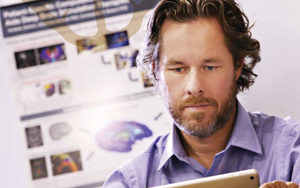
For many who suffer from debilitating neurological disorders such as Parkinson’s Disease, the constant muscular tremors are an unbearable symptom. Just drinking from a cup can be an overwhelming challenge.
When medication doesn’t work, brain surgery to destroy certain cells can be risky, and the results are irreversible. But there has been an emerging third option — deep brain stimulation (DBS), a therapy in which electrodes are implanted in the patient’s brain that deliver continuous electrical pulses to control motor function.
University of Utah bioengineering associate professor Christopher Butson has been researching ways to improve DBS systems to make them more effective and convenient for patients who wear them. He believes an answer lies in mobile tablets and smartphones.
 For many who suffer from debilitating neurological disorders such as Parkinson’s Disease, the constant muscular tremors are an unbearable symptom. Just drinking from a cup can be an overwhelming challenge.
For many who suffer from debilitating neurological disorders such as Parkinson’s Disease, the constant muscular tremors are an unbearable symptom. Just drinking from a cup can be an overwhelming challenge.